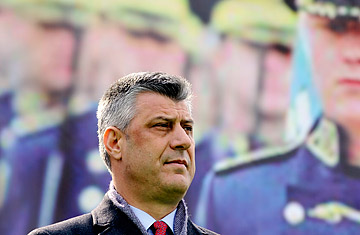
Kosovo's Prime Minister Hashim Thaci takes part in a ceremony in Pristina, Kosovo, March 5, 2012.
Nearly 13 years ago, the ethnic Albanians of Kosovo, backed by NATO, defeated Serbia. Now, however, the western Balkans are on edge again. Serbia, still angry about Kosovo's unilateral declaration of independence in 2008, has been accused of encouraging ethnic Serbs living in Kosovo, particularly in the Serb-majority areas in and around the city of Mitrovica, to vote in Serbia's May 6 parliamentary elections. Kosovo calls this an attack on its sovereignty and has complained that Serbia is trying to redraw the borders of its countries. NATO has sent an additional 700 troops to northern Kosovo to help defuse the situation.
In the midst of this tension, Kosovo's prime minister Hashim Thaçi, who remains popular at home despite a scathing 2010 Council of Europe report that alleged that he had indirect links to an illegal organ theft ring, embarked on a goodwill tour in the United States. The former political leader of the Kosovo Liberation Army met with Secretary of State Hillary Clinton and Vice President Joe Biden as well as potential Kosovo investors. On his last day before returning home, he sat down with Time.com and Roads and Kingdoms to talk about independence, Serbia, and NATO.
Question: Was there any disappointment in not meeting with President Obama?
Thaçi:Absolutely not. I was invited here based on the formal invitation of the Vice President and the Secretary of State, and I had formal meetings only scheduled only with them. So I'm going back fully convinced that the support of the United States for Kosovo will remain unshaken.
How important is that support for your aspirations in Kosovo?
It is of utmost importance [because of] the political aspect but also the military presence within NATO. But now my struggle is how to strengthen this presence in a different way, bringing new American investments in Kosovo.
If a Republican wins the 2012 presidential election in the States, do you expect the same level of support?
I wouldn't connect our aspirations, our values, with the ruling party here whether they are Democrats or Republicans.
Serbian media has labeled your call to have all Albanians united in one country a "war cry." Do we have to worry about further military conflict in your region?
Definitely and firmly I say that the wartime in Kosovo and the western Balkans is over. And all I fight for is to maintain the integrity and sovereignty of Kosovo, as an independent country, but with open borders and integrated fully into the EU and NATO.
Would Kosovo join Albania, especially down the road?
We will be together within the European family, but as independent countries.
Why is the Serbian election outreach in northern Kosovo on May 6 viewed as a threat?
The intention of Serbia to organize its own elections within the territory of a sovereign country is a complete violation of our constitution. Under no circumstances will we allow for Serbia to organize elections on Kosovo soil.
You have said that if your northern border is redrawn to exclude majority-Serb areas, then the Macedonian border will have to be redrawn to include ethnic Albanian areas into Kosovo.
First of all, there will be no threat of partitioning of Kosovo's territory, there will be no exchange of territories, and there will be no special autonomy in northern Kosovo. However, if anybody in Brussels has this idea of changing the borders, then this will not stop only in Kosovo or in the neighboring countries. It will go even further in the entire western Balkans. It will affect at a minimum six states.
Is this a threat to change the borders?
No, it's a reality. Every country in the region has one small Mitrovica on the inside.
How integrated are Serbs and Albanians in Kosovo: do they intermarry, do they live in the same buildings?
Having in mind what Serbia did to Kosovo Albanians during the war, having exercised that kind of genocide, I wouldn't say that there is a huge love between the two communities. But still it is crucial to emphasize that both communities have the will and the desire to live together side by side. It is improving.
Were you involved in, or did you have knowledge of, this organ theft scheme [allegedly involving organs that were harvested from executed Serbian prisoners and sold on the black market] that the Council of Europe report linked you to?
This is a fictional report that nobody can believe. The allegations are false, nothing like that has ever happened. [We] have nothing to hide, we have invited the investigation task force and EU investigators to conduct their job and to bring the truth.
In my struggles for the freedom of my country, for the freedom of my people, I have had to deal with many opponents. In the last 25 years, I've been a fugitive, or I have been hunted by Serbia. I can say that I have been a target for Serbia since my childhood.
I want all this to belong to the past, and I invite everybody to focus on the concrete issues and not waste time on the fictional stories.
But this is a very heavy burden and an unjust burden for Kosovo. And it's a difficult issue to deal with me personally, a difficult issue for my family, and for my son, when I have to face these unimaginable allegations.
When will Kosovo join NATO?
We are ready [laughs]. We will first try to join the NATO Partnership for Peace, with the clear aim that in a later stage, once we meet all the criteria, we become full-fledged members of NATO.
Roads and Kingdoms, a new journal of foreign correspondence, food and travel, conducted this interview in conjunction with Time.com.
